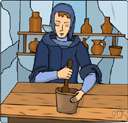helot
Also found in: Thesaurus, Encyclopedia, Wikipedia.
Related to helot: agora
hel·ot
(hĕl′ət)n.
1. Helot One of a class of serfs in ancient Sparta, neither a slave nor a free citizen.
2. A person in servitude; a serf.
[From Greek Heilōtes, pl. of Heilōs, Heilōt-.]
American Heritage® Dictionary of the English Language, Fifth Edition. Copyright © 2016 by Houghton Mifflin Harcourt Publishing Company. Published by Houghton Mifflin Harcourt Publishing Company. All rights reserved.
Helot
(ˈhɛlət; ˈhiː-)n
1. (Historical Terms) (in ancient Greece, esp Sparta) a member of the class of unfree men above slaves owned by the state
2. (Historical Terms) (usually not capital) a serf or slave
[C16: from Latin Hēlotēs, from Greek Heilōtes, alleged to have meant originally: inhabitants of Helos, who, after its conquest, were serfs of the Spartans]
Collins English Dictionary – Complete and Unabridged, 12th Edition 2014 © HarperCollins Publishers 1991, 1994, 1998, 2000, 2003, 2006, 2007, 2009, 2011, 2014
hel•ot
(ˈhɛl ət)n.
1. (cap.) a member of a class of serfs in ancient Sparta who were bound to the land and owned by the state.
2. a serf or slave.
[1570–80; < Latin hēlōtēs (pl.) < Greek heílōtes]
hel′ot•ry, n.
Random House Kernerman Webster's College Dictionary, © 2010 K Dictionaries Ltd. Copyright 2005, 1997, 1991 by Random House, Inc. All rights reserved.
ThesaurusAntonymsRelated WordsSynonymsLegend:
Switch to new thesaurus
| Noun | 1. |  helot - (Middle Ages) a person who is bound to the land and owned by the feudal lord helot - (Middle Ages) a person who is bound to the land and owned by the feudal lordEurope - the 2nd smallest continent (actually a vast peninsula of Eurasia); the British use `Europe' to refer to all of the continent except the British Isles thrall - someone held in bondage Dark Ages, Middle Ages - the period of history between classical antiquity and the Italian Renaissance |
Based on WordNet 3.0, Farlex clipart collection. © 2003-2012 Princeton University, Farlex Inc.